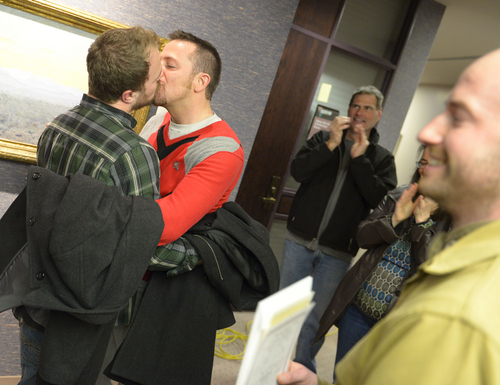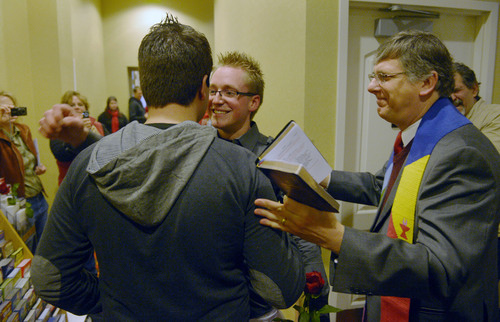This is an archived article that was published on sltrib.com in 2014, and information in the article may be outdated. It is provided only for personal research purposes and may not be reprinted.
Jessica Church woke up Monday morning happy to begin her wedding week.
She had scheduled a hair appointment for the weekend, a manicure for Tuesday and her parents were finalizing plans to host the celebration Saturday at their Layton apartment complex.
"I was all excited," Church said.
But Church's and fiancée Vanessa Garcia's plans came to an abrupt halt on Monday when the U.S. Supreme Court issued an order staying U.S. District Court Judge Robert J. Shelby's Dec. 20 decision that overturned a ban on same-sex marriages.
Rev. Heron Herodias, who planned to marry the couple, called the county offices to confirm their license was still valid. The answer was no.
"According to their legal interpretation, I would be committing a class A misdemeanor if I signed [the] paperwork," Garcia said.
That predicament is exactly what the state says it hoped to avoid when it attempted to get a stay in the hours and days immediately following Shelby's ruling. The decision now is on hold at least until the 10th Circuit Court of Appeals rules on the state's appeal.
Since Monday, Utah Attorney General Sean Reyes and a legal team have been working "around the clock" to determine what the stay means for couples who were legally married during the 17 days between Shelby's ruling and the Supreme Court order.
County clerks estimated more than 1,300 same-sex couples were married. An unknown number of others received licenses but, like Church and Garcia, had not yet married.
Reyes said earlier he was "carefully evaluating" the situation because it "impacts Utah citizens so personally."
Spokeswoman Missy Larsen said the Attorney General's Office could give Utah Gov. Gary Herbert its findings as soon as Wednesday.
In its filings to the 10th Circuit Court and the U.S. Supreme Court, the state has indicated it wanted to avoid having to "unwind" same-sex marriages if it prevails in its appeal, a signal that it might want to undo the marriages later.
While it's true, as Reyes said, that there is no "clear legal precedence" to guide Utah, same-sex couples in two other states have landed in a similar situation.
In 2004, more than 60 same-sex couples married in Sandoval County, New Mexico, after receiving licenses from county clerk Victoria Dunlap, who said at the time she could find no state law against it. The clerk's actions sparked a political uproar and New Mexico Attorney General Patricia Madrid filed a lawsuit that restrained Dunlap from continuing to issue licenses to same-sex couples.
Questions about the validity of the Sandoval marriages lingered for a decade. Subsequent county clerks apparently stamped the licenses issued by Dunlap "void" or "illegal."
But in August, New Mexico Attorney General Gary King sent a letter to the county informing the current clerk that only courts, not clerks, have the authority to declare those 2004 marriages invalid.
"Unless and until a court of competent jurisdiction acts, a marriage license issued by a county clerk in New Mexico is presumptively valid," King wrote in his Aug. 28 letter.
In December, the New Mexico Supreme Court ruled it was unconstitutional to deny marriage licences to same-sex couples.
The year 2004 also was pivotal in California's same-sex marriage battle.
On Feb. 12, 2004, San Francisco Mayor Gavin Newsom ordered clerks to issue licenses to same-sex couples in defiance of state law.
Some Utah lawmakers, who were debating Amendment 3 that February, called what was happening in San Francisco — as well as Massachusetts, which was set to begin allowing gay marriages that spring — as "confusion" and "anarchy."
A month later, the California Supreme Court ordered the city to stop issuing licenses; by then, about 4,000 couples had received licenses.
In August 2004, the state's high court voided every single one of those licenses — which led to a lawsuit that ultimately ended with the court deciding in May 2008 that same-sex marriage was a fundamental, protected right. That upended a ban on gay marriage in place since 2000.
Some 18,000 California couples had married by Nov. 4, 2008, when voters passed Proposition 8 to again ban same-sex marriages. About two months after the general election, the California Supreme Court ruled the marriages that occurred before passage of Proposition 8 were valid.
That decision, according to Doug NeJaime, a law professor at the UC Irvine School of Law, was based on the fact the marriages conformed to the law in place at the time they occurred.
Other same-sex couples were unable to marry in California while Proposition 8 was challenged in court.
A federal judge later invalidated Proposition 8, but his order was stayed during appeals to the Ninth Circuit Court of Appeals and then to the U.S. Supreme Court by proponents of the ban. The Supreme Court ruled in June the proponents did not have standing to bring the challenge, leaving in place the lower court finding that gay marriage is legal.
NeJaime said he believes the status of same-sex marriages that took place in Utah after Shelby's ruling is more complex because his order had not yet gone through the appeals process.
"You didn't have a final court decision," NeJaime said. And, unlike California, Utah has given no rights to same-sex couples.
It is a very difficult situation, agrees Stephen Wermiel, who teaches constitutional law at American University in Washington, D.C.
"It seems as though the marriages were validly licensed by public officials who were told that the Utah law was unconstitutional by a federal judge with no delay in effect," Wermiel said. "So the issuance of those licenses was a valid act of authorized government officials. I think that argues in favor of leaving the licenses in place. When government officers take valid legal actions in good faith affecting the rights of individuals, the legitimate claims of rights of those individuals is entitled to some weight."
That's the view being taken by the ACLU of Utah, which is closely watching what happens next.
"We come down on the side of the marriages being valid for both state and federal purposes," said John Mejia, legal director. "The couples who were married after the judge's ruling went through the same process as any other married couple. When they were married, it is our view that they were vested with all the rights and privileges of a married couple."
Mejia said he does not believe the state would succeed were it to try to get those marriages invalidated.
What may be relevant to the situation in Utah, NeJaime said, is the California Supreme Court's finding that the couples who married before Proposition 8 became law had come to rely on the rights and privileges marriage brought them.
Michael Ferguson and Seth Anderson, the first same-sex couple legally married in Utah, said Monday they are confident their marriage will remain valid, but the process is a bit unsettling.
"There's uncertainty [about] whether we'll be able to file taxes jointly, will we be treated as any other married couple would in Utah? That's iffy," said Anderson. "I'll be angry that I won't be able to file joint taxes with my husband like anyone else could do."
"We're in this weird little state of middle ground," he added, and "the time frame will likely be a few years."
Salt Lake County Attorney Sim Gill is clear on what the stay means for couples like Church and Garcia, who received a license but had not yet solemnized their marriages: state code forbids anyone from solemnizing a marriage that is prohibited under state law. Same-sex couples are now back on the "prohibited list."
"If somebody performs a marriage based on [a] license, it is a potential violation of the law," Gill said.
The issue is murkier for couples who married and returned their licenses before Monday's stay, Gill said.
"What is the legal status of those couples? They did get married when they had the lawful right to do so. They got their applications lawfully and got married lawfully. What does that affect?" Gill asked. "As the legal counsel for Salt Lake County government, I am probably going to have to address this issue."
For now, that puts Church and Garcia's marriage plan on hold.
Church and Garcia, 23 and 26, were high school sweethearts who have been a couple for eight years. They are raising a 5-month-old son together — Church is his biological mother, via a sperm donor — and had planned to marry and begin the adoption process for Garcia. Saturday was the first day the family was available for a wedding.
"I absolutely hate it," Church said of the stay. "But them telling us we can't get married isn't going to keep us apart. We wear rings, we tell everyone we're married, we're together forever."
State still seeking help
The Utah Attorney General's Office has extended the deadline for applications from outside counsel interested in helping it defend a ban on same-sex marriage for another week to "increase competition" for the contract.
Proposals from individuals and firms are now due Jan. 14 at 5 p.m. The state is seeking help on its appeals before the 10th Circuit Court of Appeals and potentially the U.S. Supreme Court.
According to a press release, applicants' proposals must outline appellate experience in both courts and include hourly rate fees and a maximum cost cap.
Proposal requirements are available at http://www.bidsync.com, under solicitation # JP14016, or at http://1.usa.gov/1cG2sCM.





